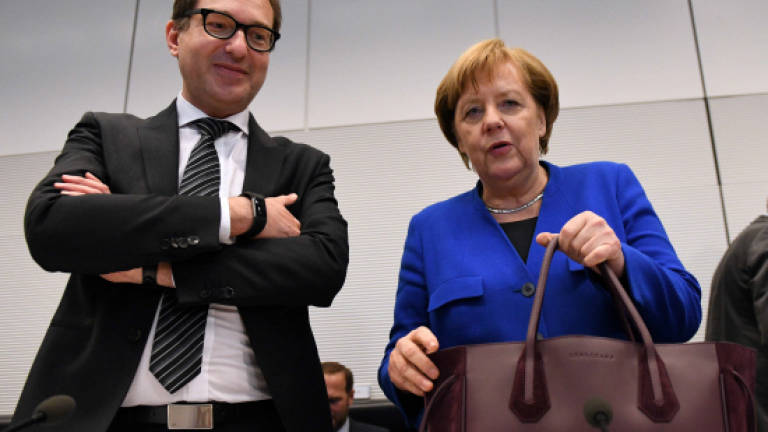Germany's Merkel makes breakthrough in bid to form coalition

BERLIN: Chancellor Angela Merkel said her conservatives reached a breakthrough deal Friday with Germany's second biggest party, the Social Democrats, to build a new coalition government to give Europe a "fresh start".
After more than 24 hours of talks and months of political paralysis, red-eyed party chiefs and their negotiating teams reached an in-principle agreement that could lead to a new government for the biggest EU economy in coming months.
In the all-night negotiations in Berlin, the three sides – Merkel's Christian Democrats, Horst Seehofer of her Bavarian allies the CSU, and the Social Democrats (SPD) of Martin Schulz – hammered out a 28-page paper as the basis for the formal coalition talks ahead.
The hope was to form a new government "before Easter", which falls on April 1, said the CSU's Seehofer.
In their joint blueprint, the parties agreed on key policy outlines – to join EU partner France in a push to "strengthen and reform" the eurozone, to limit the influx of asylum seekers to Germany to around 200,000 a year, and to refrain from tax hikes given the healthy state of public coffers.
Merkel voiced relief that the trio of parties had passed a milestone, telling a press conference that "the world is not waiting for us – we need a fresh start in Europe. A fresh start for Europe is also a fresh start for Germany."
European Commission president Jean-Claude Juncker said the deal was "significant" and "positive" for the EU's future, while French President Emmanuel Macron said he was "satisfied and happy" that the deadlock was broken.
Despite the agreement, potential pitfalls remain, including upcoming votes by sceptical SPD delegates and members that could yet derail plans for another left-right "grand coalition" – the constellation that has ruled Germany for the past four years and remains in charge as a caretaker government.
Marathon talks
Germany has been in political limbo since a Sept 24 election in which Merkel failed to win a clear majority – in part due to the rise of the far-right Alternative for Germany (AfD) which took millions of votes from all major parties.
Merkel initially turned to two smaller parties, the Free Democrats and Greens, to form a new coalition government for her fourth term. But when those talks collapsed in November, she had to once more woo a reluctant SPD for a new power pact.
Merkel, Seehofer and Schulz went into the talks Thursday warning of major obstacles ahead but also knowing that their political lives were on the line, given their poor election showings.
"It would be the end for all three if this coalition does not come about," said Karl-Rudolf Korte of Duisburg-Essen University.
The coalition blueprint starts with Europe, pledging to, "in close partnership with France, sustainably strengthen and reform the eurozone so that the euro can better withstand global crises".
The plan supports the creation of a European Monetary Fund that could lend to countries in economic crisis, but only pledges to study other Macron ideas, including a common eurozone budget and finance minister.
Merkel 'past zenith'
The deal cleared a first hurdle when the SPD's 45-member board approved it. But it could still be torpedoed when 600 party delegates need to give the green light at a congress on Jan 21, or in a final vote by more than 400,000 rank-and-file members.
Scepticism is high after the SPD scored a humiliating 20.5% in the September ballot, its worst of the post-war era. That initially led Schulz to vow to head into opposition to rebuild the party's fighting spirit and voter appeal.
The SPD's youth wing chief Kevin Kuehnert said he would embark on a national tour to press his case against a new grand coalition, known as "GroKo" in German political shorthand.
The deal "smells strongly of a continuation of the governing style we know from the last grand coalition, which didn't do much good for society or for the SPD", he said.
Opinion polls suggest most Germans are less than enthusiastic about a GroKo, with a Focus magazine survey giving it just 30% support.
Political observers also judge that Merkel, damaged by the poor election outcome and subsequent stalemate, is now in the twilight phase of her reign.
"Angela Merkel is past her zenith," Oskar Niedermayer of Berlin's Free University told business daily Handelsblatt.
"In the interest of her party's electoral strength, she should not stay in office for the entire legislative term." — AFP